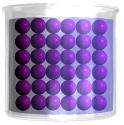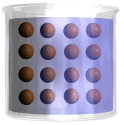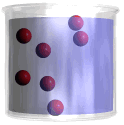States of matter
Melting occurs when the rigid
lattice arrangement of particles breaks down When a solid is heated, the heat energy goes to
the particles. It makes them vibrate more and more, and eventually the strong forces between the particles, that hold them in the rigid lattice,
are overcome, and the particles start to move around. The solid has now melted. Evaporation - the fast moving particles escape from the bulk of the liquid When the liquid is heated,
the heat energy goes to the particles,
which makes them move faster. There
will be some particles, which will move faster than others. The
fast moving particles at the surface of the liquid will overcome
the forces of attraction from other particles and escape. This is
known as evaporation. Boiling - all molecules are fast enough to escape the liquid phase When the liquid
gets hot enough, almost all the particles
have enough speed and energy to overcome the forces of attraction
and escape each other. At this point big bubbles of gas form inside
the liquid as the particles break away from each other. This is
known as boiling.

Changes
of state always involve heat
energy moving IN or OUT of a system
Melting


Evaporation


Boiling


Tags:Melting, Evaporation, Boiling, Change of state, Science solids liquids and gases